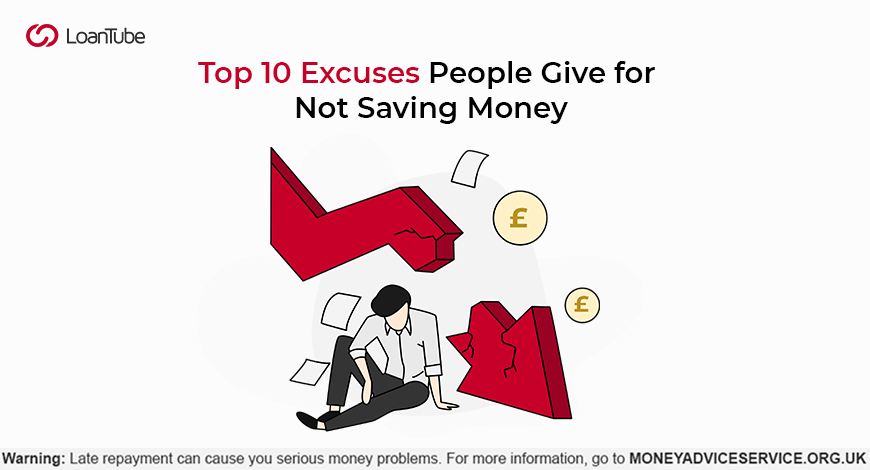Savings are the pillars of a stable financial life. But it is surprising to see how often we overlook the importance of saving money. In our naive attempt to lead a #YOLO lifestyle, we tend to make the most absurd excuses to spend money like there’s no tomorrow.
However, the lack of a financial safety net can cause a lot of inconvenience during an emergency. Having an emergency savings fund can give you the strength to sustain a financial blow. And yes, this fund is different from your retirement fund!
We all come up with different reasons to not build a savings pot. Can you spot your excuse in this article? Read on to find out!
Maximise your options: Compare and apply for loans below with LoanTube
Apply Filters
10 excuses people give for not saving money
We typically associate feelings of negativity, boredom with the act of saving money. If it’s not that, then it’s the good ol’ “I have my whole life to worry about saving money”. The idea is to save in your 20s so that you can lead a stress-free life in your 40s.
Saving is more about the mindset – it’s about your ability to see the bigger picture. It’s all about putting your mind to it.
But for now, here’s what people say to get out of an uncomfortable adult conversation – the money talk:
- I don’t have an adequate income to save: Most of us switch to an upgraded lifestyle almost immediately after getting a raise – overlooking unnecessary expenses, shopping more often, the urge to spend on better clothing, etc. As you glide into your new lifestyle, you eventually start feeling that your income isn’t sufficient enough for you to save money. Identify the gap and start living within your means – prioritise saving even if you don’t have a 5-figure salary.
- I need to settle my debts before I start saving: This, for a change, is not a lousy excuse. Many of us want to relieve ourselves of debt engagements before we can actually start saving money. We get stuck in a debt cycle because we have to use our current income or credit to pay off ongoing debts. You could break the cycle by focussing on building savings and assets conducive to efficient debt management.
- I’m too young to stress about saving money: When it comes to savings, age is never a factor. It is better to save money in the early stages of your career than regretting not saving during an emergency. If you think that you can’t enjoy your life without spending money, it may signify a deeper problem. Who says you can’t have fun and save for a comfortable future simultaneously? You could gamify the activity to make it more fun by involving your friends!
- I’m already contributing towards my retirement fund: Contributing towards your retirement fund is an excellent way to secure your future, but it doesn’t cover you for the rainy days. If an emergency strikes, it would be unfair to rely on your retirement funds to cope with it. Having a separate savings pot could help you tackle such crises.
- The interest on savings is so low, what’s the point: People often deem this particular excuse radical. But understand this – low interest is better than no interest. Plus, what return on investment will you get by spending this money? Unless you spend your money on an appreciating asset.
- I can always use my credit card for emergencies: Credit cards give you quick access to funds, which is helpful when you need money to cope with urgent expenses. But at the end of the day, it is credit, and you will need to pay it back. Savings will ease your financial burden because you’ll have enough to pay back your balance. Plus, you won’t even have to use your credit card and pay a hefty interest if you have adequate savings.
- I can use my home equity if I ever need cash: Home equity loans allow you to tap into your equity in a property to leverage against credit. You can usually borrow a more considerable amount at lower interest rates with home equity loans. Although, these loans pose a risk of repossession to your property as lenders can foreclose it if you default. So ask yourself if it is even worth the risk.
- I can always depend on my inheritance for money: You’re lucky if you find yourself in this envious position. Even if you’re expecting a colossal inheritance, depending on one thing alone isn’t a smart way to deal with a financial crunch, especially in the long run. So, set aside small savings each month, and keep incrementing the amount as and when you get a raise. Over time, you’ll have abundant savings to rely upon.
- It’s practically impossible to save in this economy: Economic changes are inevitable – there will always be something or the other causing an economic misbalance. However, economic instability is the very reason you need to have a financial cushion to fall back on. So, inculcate the habit of saving money each month to stay prepared for an unprecedented economic meltdown.
- I want to live young, wild and free #YOLO: Some people live by the YOLO, or You Only Live Once mantra. While we can normally get our way with things when we’re young, thriving, and in our prime earning years, things tend to go downhill as we age. So, it is important to find a way to balance pleasure and responsibility because you owe it to your future self!
How to overcome your urge to spend?
- Understand your spending triggers: Try to identify your spending trigger – for instance, a certain mood, environment, peer pressure, lifestyle, etc. Acknowledgement is the first step towards change – once you learn your triggers, work out ways to curb the urge.
- Learn to budget your expenses: We cannot emphasise the importance of budgeting enough – it is a crucial aspect of efficient financial planning. Set aside an amount for each month and then divide your expenditures into different categories. Stick to the amount that you allocate to each category.
- Set long and short-term financial goals: Long-term financial goals generally aid the asset-building process. Short-term goals are ideal for smaller expenses or investments. For instance, owning a property or having a retirement fund can be categorised as a long-term goal, and relinquishing the habit of eating out too often, or saving £30 each month, could be a short-term financial goal.
- Stop relying on credit: Stop using credit literally and figuratively – switch to cash and only carry the amount of money you will need to use. Leaving your credit card at home can significantly decrease your dependence on credit.
- Track your expenses: There are an array of applications and online tools that can help you track your expenses. Alternatively, you can go the traditional way and use a dedicated notepad for your daily, weekly and monthly outgoings. Knowing where your money goes will help you cut down on unnecessary expenses.
Conclusion
You might never run out of excuses to save money, but you may run out of money. These excuses will become more and more hollow and facetious as you age, but with a sense of regret. Invoke a sense of discipline and commit to your present and future self. Overcome the psychological barrier and start saving so that you can enjoy the life you deserve.


